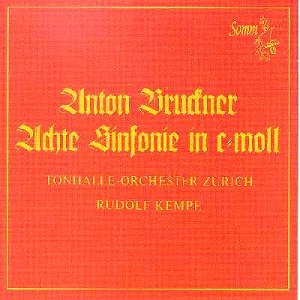BRUCKNER
Symphony No.8 in C minor (1890 version/Haas)
 Zurich Tonhalle Orchestra/Rudolf Kempe
Zurich Tonhalle Orchestra/Rudolf Kempe
 SOMM (Celeste Series) SOMMCD 016-2 (2
CDs)[82'02"]
SOMM (Celeste Series) SOMMCD 016-2 (2
CDs)[82'02"]
Crotchet
Amazon
UK

I'm not absolutely sure how much Bruckner Kempe recorded. This Eighth is
from 1971 (on LP it was on the Tudor label). There's also a Munich Philharmonic
4 & 5 2-CD set that I recently bought on the Acanta Pilz label. The Pilz
transfers are poor - excessive no-noising has, frankly, buggered good sound.
Now I've found pristine copies of BASF's LPs: the black discs offer excellent
results to complement Kempe's notable readings and the CDs can be consigned
to the bin.
I know Kempe conducted the Second and Seventh Symphonies but I don't think
he recorded them. I never heard the Tudor LPs of 8 so I'm grateful to Somm
for restoring what turns out to be a fine performance. Somm's transfer is
good too (or as good as the source material will allow it to be). The dynamic
range is restricted but the sound is open and well detailed. There are some
audible edits and the climax of the slow movement brings a change of perspective.
Kempe leads a lyrical 8th and never overplays the rhetoric. This isn't a
Heaven-storming rendition but one that assuredly unfolds Bruckner's grand
design; sights firmly set on long-term objectives. In short this is as musical
account of Bruckner's massive C minor Symphony as you will get. The playing
is good without being outstanding and I would understand if some listeners
found this rendition lacked gravitas. What it doesn't lack is an innate
understanding of the letter of the score. To that may be added the sense
of concentration with which the musicians unfurl the music.
This is one of those performances where nothing spectacular happens, no real
revelations are heard, and yet one is gripped by the sheer rightness of it
all. In many ways this is great conducting, Kempe displaying wise and economical
leadership. If, as recorded, the Zurich Tonhalle Orchestra is penny-plain
and occasionally fallible, its musicians really know what this music is about.
What I like about Kempe's manner is that nothing is forced, nothing imposed.
The music grows organically and is allowed to speak for itself (and the Finale's
structural imperfections are less obvious with Kempe). If you like what Bruckner
says then Kempe's masterly traversal should prove very satisfying; not as
a first choice necessarily but when you want to go back to the music without
distraction.
Colin Anderson
 (performance)
(performance)
 (recording)
(recording)
